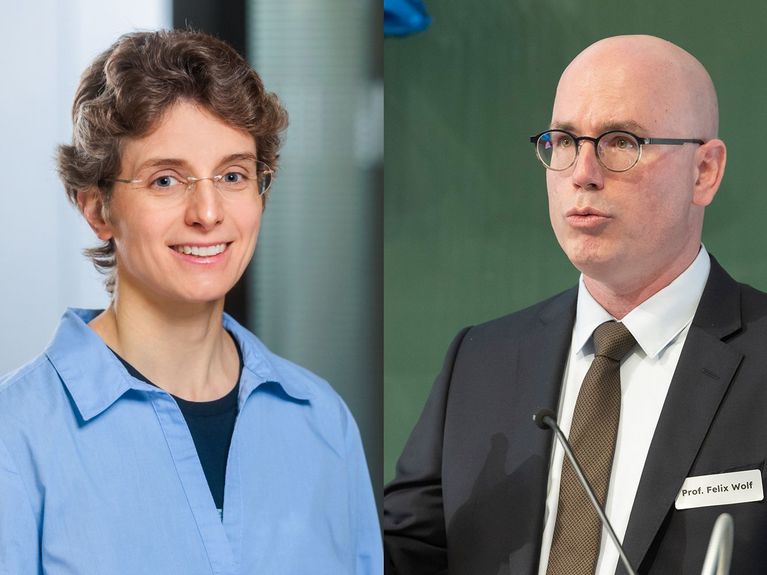Interview
Back to Germany for the Helmholtz Young Investigator Group

[Translate to Englisch:] Martina Schmid ist Professorin für Experimentalphysik an der Universität Duisburg-Essen. Ihr Spezialgebiet ist die ressourceneffiziente Energieumwandlung, insbesondere durch multi-optische Konzepte für Solarzellen. Von 2012 bis 2017 war sie Helmholtz-Nachwuchsgruppenleiterin am Helmholtz-Zentrum Berlin. Felix Wolf ist Informatikprofessor an der TU Darmstadt, er forscht zu Paralleler Programmierung. Seine Nachwuchsgruppe leitete er von 2006 bis 2011 am Forschungszentrum Jülich. Bilder (v.l.n.r.): Universität Duisburg-Essen; Klaus Mai
Martina Schmid and Felix Wolf were both independently conducting research in the USA when they were accepted into the Helmholtz Young Investigator Group. In an interview, they told us how they experienced the new phase of independence, what challenges they faced and what tips they would give to prospective group leaders.
Ms. Schmid, Mr. Wolf, could you tell us how you experienced the start of your own Helmholtz Young Investigator Group?
Martina Schmid: I remember that everything happened very quickly. I came back from the USA for the junior research group and was able to take on the full responsibilities of a group leader straight away. I particularly enjoyed the newfound independence, both in terms of topics and personnel responsibility. At the same time, the collaborations, for example, with the university, non-university research institutions and within the Helmholtz Center, were a valuable support. With the Young Investigator Group, I was able to try things out and received support from competent mentors via the Helmholtz Association and from the university. This constellation also opened up effective paths to third-party funding for me.
Felix Wolf: It was similar for me. I also returned from the USA for the Helmholtz Young Investigator Group. After my return, I found myself in a familiar institute structure, but with the new challenge of recruiting my own staff. However, with the support of the HR department, this went smoothly. As a postdoc in the US, I had already experienced a degree of freedom, but leading a junior research group brought with it additional responsibility for staff and doctoral students in particular.
What challenges and opportunities arose for you during this phase?
Martina Schmid: A major challenge was to develop and set up laboratories with my group within the time available and thus expand the experiments. Fortunately, we managed to do this so efficiently that we were able to use our instruments productively.
Felix Wolf: Soon after starting my group, I was offered a W1 professorship at RWTH Aachen University, so teaching was added to my responsibilities. I designed my courses myself right from the start and identified strongly with them, then immediately became active in acquiring third-party funding early on, with a “Virtual Institute” funded by the Helmholtz Initiative and Networking Fund helping me to build up a constantly growing cooperation network.
Did you have alternative career plans if you had not been able to head the Helmholtz Young Investigator Group?
Martina Schmid: Yes, I had considered an offer for a habilitation position and also thought about moving into industry. However, the habilitation position did not offer a tenure option and was thematically fixed. With my own group, I have much more creative freedom and can drive topics forward more effectively.
Felix Wolf: Before I was accepted, I had considered staying in the USA. During my time as head of the junior research group, I concentrated fully on the goal of leading the group to success.
What advice would you give to scientists who are now in the postdoc phase?
Felix Wolf: In my opinion, it is highly recommended to apply for your own group early on in the postdoc phase. I myself submitted my application after one and a half years. It not only offers the opportunity to advance your own research ideas, but also to significantly accelerate your academic career.
Martina Schmid: I agree and would add that the combination of such a group with a junior professorship is another important aspect. It is therefore advisable to seek contact with Helmholtz centers at an early stage and find out about possible synergies.
What is your tip for anyone setting up their own group?
Martina Schmid: One key to success is definitely attracting excellent people to the team. My first doctoral students were outstanding and contributed significantly to the success of the group.
Felix Wolf: I can only confirm that. In addition to recruiting talented employees, it is just as important to offer them prospects and development opportunities. They must be able to identify with the Group’s goals and vision.
Martina Schmid: Exactly, and that’s the great thing about a newly founded junior research group: It offers plenty of scope for co-design. This motivates and encourages the team’s creativity.
Felix Wolf: Another advantage of such a group is that it is somewhat decoupled from the day-to-day business of the institute. This allows the team members to concentrate more intensively on their research. A symbiotic relationship is created between the group leader and the members with the common goal of producing high-quality publications. This is a win-win situation for everyone involved. The management of the institute also benefits and supports the group, as its success radiates through the entire institute.
Readers comments